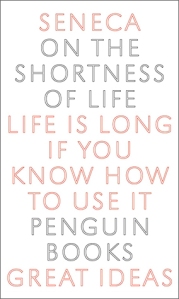
“People are frugal in guarding their personal property; but as soon as it comes to squandering time they are most wasteful of the one thing in which it is right to be stingy.”
Lucius Annaeus Seneca wrote the above 2,000 years ago and yet his sentiment is as prescient today as it was when he was a tutor to Roman emperor Nero. In De brevitate vitae (On the shortness of life), he continues:
“Can anything be more idiotic than certain people who boast of their foresight? They keep themselves officiously preoccupied in order to improve their lives; they spend their lives in organizing their lives. They direct their purposes with an eye to a distant future. But putting things off is the biggest waste of life: it snatches away each day as it comes, and denies us the present by promising the future. The greatest obstacle to living is expectancy, which hangs upon tomorrow and loses today. You are arranging what lies in Fortune’s control, and abandoning what lies in yours. What are you looking at? To what goal are you straining?”
As I look back on the life that might have been this advice seems obvious if cynical. The future plans I worked toward, only to see cancer obliterate, seem like wasted time. However, was it? Are we not supposed to make plans? How can one go from day to day, “living in the moment” with no care for tomorrow? The clue comes in another Seneca quote, “Life is long, if you know how to use it.” But how do we tease a life out of this kernel of truth?
We all seek to leave a mark on history as we careen through time at the speed of life. The uncertainty with which we live is like the cosmic dust trail left behind a comet, slowly sapping the comet of its size and us of our time. John Lennon, appropriating a sentiment from decades earlier wrote, “Life is what happens to you while you’re busy making other plans.” Drawn out to its ultimate conclusion, it is captured again by Seneca as, “Often a very old man has no other proof of his long life than his age.”
So how do we live a life full of todays, without sacrificing our wellbeing tomorrow? My wife and my future died a little over a month ago. Everything we worked toward is gone. I am fifty years old and alone. How do I start again? What am I working toward? How can I have any faith in a future I now build now knowing my recent future died with my wife? Where do I turn to begin? Neither time nor money seems important now. With whom will I share either? I do not want to travel alone, hell I don’t even want to eat dinner alone. Where I will live next year is based on no future plans with anyone, no school system for the kids, nothing. I am rootless, floating on the ocean of time with neither heading nor concern. Where I land means nothing.
Thankfully, I have my children. Without them I would not even carry an anchor. However, I know that they will settle someplace and I will want to be near them. But graduate school and careers stand like so many seasons and storms before I reach land. Perhaps it is a good thing that I am uprooted at this point. Perhaps the grieving process requires a certain amount of time and the kid’s blowing about like dandelion seeds will afford me the time to find myself and see a future alone. But that takes me back to Seneca. How do I live a life now without concern for the future and without sacrificing my sanity? Does living for today have to indicate a rudderless life? Seneca was a stoic and lived frugally. Without material goods, it is easier to ignore the requirements the future, but that is not how we are groomed. I would like a balance between Seneca’s today and propriety’s tomorrow. However, today I simply attempt to stay busy and tomorrow means nothing. Maybe in time it will change. I guess the question is, how many todays will be wasted? Seneca has no answer to that.
